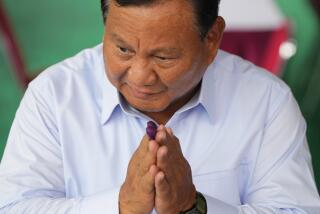Indonesian Military Reportedly Hit a Dead End
- Share via
DARWIN, Australia — In a policy about-face that evolved over the past week, the Indonesian military concluded that it had no choice but to surrender East Timor peacefully to a U.N.-sanctioned force that is expected to enter the troubled territory in the coming week, Western military sources said Friday.
The shift greatly increases chances that the Australian-led peacekeepers will not face serious resistance in their initial deployment and, in a best-case scenario, will encounter a calm environment as they try to restore civility to a region racked by months of anarchy and bloodshed.
Western diplomats said there is growing evidence to suggest that many--though perhaps not all--senior Indonesian commanders never intended to honor the results of an Aug. 30 referendum in which East Timorese voted overwhelmingly for independence. Nor did the commanders intend to accept the presence of international peacekeepers, the diplomats believe.
But last weekend, the military’s resolve began weakening. Most crucial, U.N. sources said, was a visit to East Timor last Saturday by the Indonesian armed forces chief, Gen. Wiranto, and a high-level U.N. delegation.
Wiranto came away convinced that his soldiers in the territory were out of control, the sources said. He also realized that his commanders had not persuaded the five U.N. representatives that the military was uninvolved in the organized wave of lawlessness carried out by anti-independence militias.
Wiranto, who is believed to have political ambitions of his own, was sensitive to the groundswell of international pressure that had left Indonesia’s credibility and reputation in tatters, the U.N. officials said.
The United States played a key role in exerting pressure on Wiranto, Western diplomats said, including with a late-night call from Army Gen. Henry H. Shelton, chairman of the Joint Chiefs of Staff.
U.N. and Western officials willing to discuss the Indonesian shift in policy requested anonymity.
Signs of the new Indonesian approach were evident Friday in Dili, the nearly deserted capital of East Timor. In stark contrast to their previous disdain for civilians, Indonesian soldiers were clearing debris, sweeping out the burned and trashed residence of Roman Catholic Bishop Carlos Filipe Ximenes Belo and handing out rice to a few refugees. The soldiers fired shots into the air to chase away the militiamen they had long supported.
Military authorities also allowed the first airdrop of rice and blankets to refugees in the mountains above Ermera, about 20 miles southwest of Dili, one of four places in East Timor where thousands of independence supporters have clustered to avoid the marauding militias. The airdrop, along with a second on the nearby town of Bobonaro, was carried out by Australian transport planes.
U.N. officials in Jakarta, the Indonesian capital, said the initial airdrops provided enough food to feed only about 15,000 refugees for one day. More relief efforts are expected.
In another hopeful sign, 3,500 to 4,000 Indonesian soldiers--most of them East Timorese who had supported the government’s efforts to hold on to the territory--had withdrawn as of Friday by road, sea and air to neighboring West Timor, an Indonesian province.
Their departure was part of a continuing withdrawal of forces from the former Portuguese colony that Indonesia invaded in 1975 and annexed the following year. The Indonesian commander in East Timor, Maj. Gen. Kiki Syahnakri, told Associated Press on Friday that 3,600 of his soldiers will remain in the territory.
A week ago, as many as 25,000 Indonesian soldiers and police officers were in the territory.
Military analysts do not discount the possibility that rogue military elements--which Indonesian Foreign Minister Ali Abdullah Alatas concedes have operated unchecked in recent months--could pose a threat to the international peacekeeping force in East Timor, or that any number of things could still go wrong. The peacekeepers’ commanders acknowledge that Dili may be easier to secure than the mountainous countryside.
Australian Prime Minister John Howard said Friday that force will be met with force.
“The Indonesian army must, of course, have contemplated that if attacks were to occur, that in turn would provoke a much stronger level of intervention and retaliation,” Howard said.
The commander of the 7,000-member peacekeeping force, Australian Maj. Gen. Peter Cosgrove, was scheduled to visit Dili today accompanied by a small advance team to meet with Syahnakri, with the first troops set to arrive Monday or thereafter. But Cosgrove’s team delayed its departure, and journalists canceled a charter flight to Dili, after reports of continued militia activity on the outskirts of the city.
Meanwhile, a former commander of an anti-independence militia added to the growing evidence that the Indonesian military orchestrated the violence in East Timor.
Tomas Goncalves, who now lives in the Portuguese colony of Macao, told Hong Kong’s South China Morning Post that he and other militia leaders attended a meeting in Dili on Feb. 16, three weeks after Indonesian President B. J. Habibie offered East Timor the option of voting for autonomy within Indonesia or for independence.
During the meeting, he told the Post, Indonesian generals unveiled plans for Operation Clean Sweep, which called for intimidating voters before the August vote and killing pro-independence leaders, their children and even their grandchildren. He said the operation was run by intelligence officers from Kopassus, a special forces unit.
Goncalves said he also attended a March 26 meeting at which East Timor’s Jakarta-appointed governor, Jose Abilio Soares, ordered that priests and nuns in the region be killed. Soares was angry that civilians intimidated by the militia gunmen were seeking refuge in churches and in the homes of priests, Goncalves said.
“I could not stand it,” Goncalves told the Post. “I told them I have no problems fighting [pro-independence] guerrillas, but as a Catholic, I could not kill priests and nuns and attack the church.”
More to Read
Sign up for Essential California
The most important California stories and recommendations in your inbox every morning.
You may occasionally receive promotional content from the Los Angeles Times.













